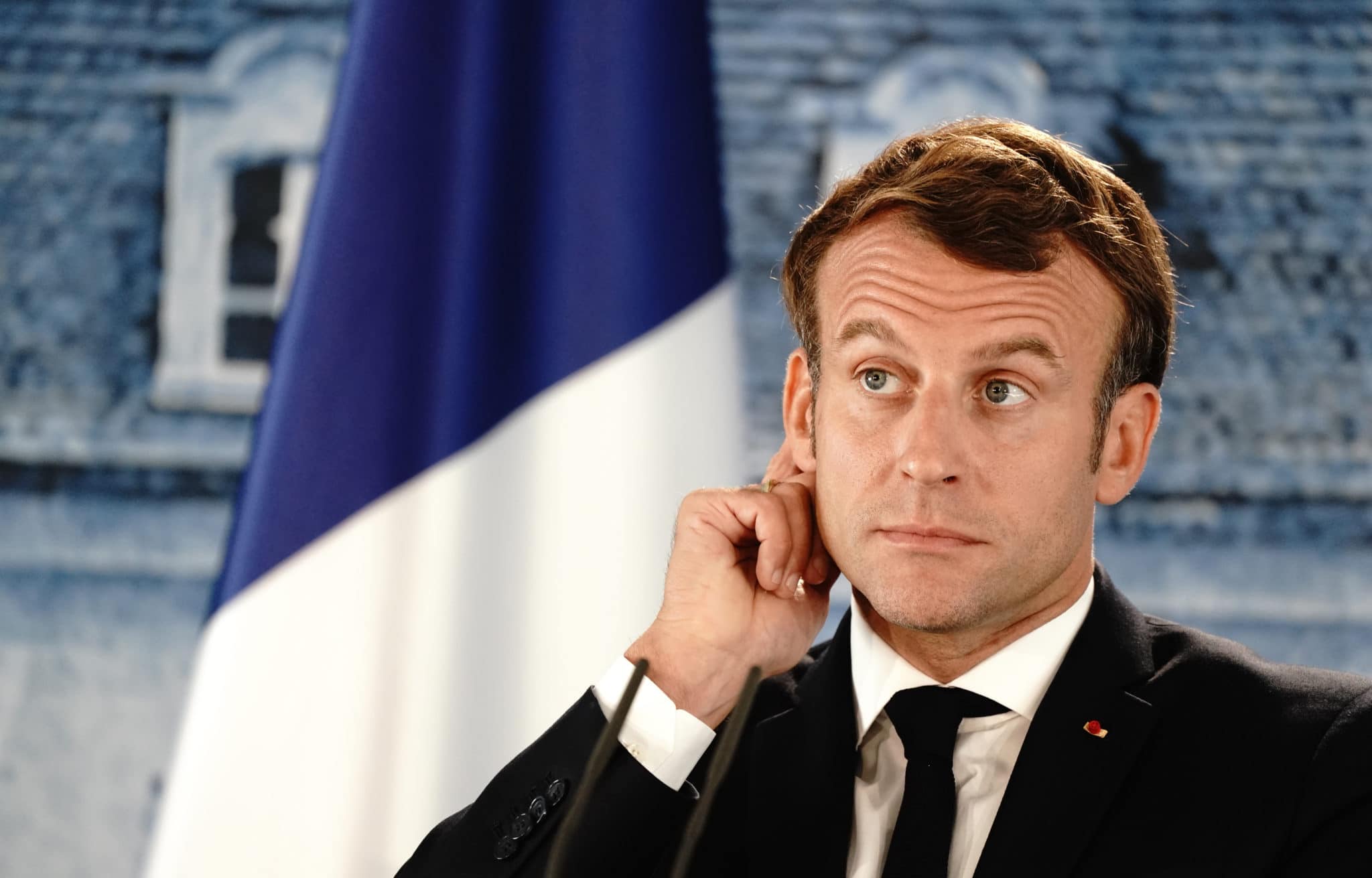 GRANSEE, GERMANY – JUNE 29: French President Emmanuel Macron gives a joint press conference with German Chancellor Angela Merkel after talks in the grounds of Schloss Meseberg on June 29, 2020 in Gransee, Germany. The German Chancellor and French President met to discuss European Union funding during the Coronavirus pandemic. (Photo by Kay Nietfeld – Pool / Getty Images)
GRANSEE, GERMANY – JUNE 29: French President Emmanuel Macron gives a joint press conference with German Chancellor Angela Merkel after talks in the grounds of Schloss Meseberg on June 29, 2020 in Gransee, Germany. The German Chancellor and French President met to discuss European Union funding during the Coronavirus pandemic. (Photo by Kay Nietfeld – Pool / Getty Images) French President Emmanuel Macron reportedly met with a Hezbollah official in Beirut in early August, according to an Aug. 31 report in the French newspaper Le Figaro.
The report said that Macron met with Mohammed Raad, who heads the Hezbollah bloc in the Lebanese parliament, for eight minutes on Aug. 6, two days after the explosion in Beirut that killed at least 190 people, injured at least 6,500 others and devastated a large area of the city.
The disaster was caused by the detonation of thousands of tons of ammonium nitrate that had been unsafely stored. In an Aug. 9 video conference with world leaders that included President Donald Trump, Macron urged them “to come together in support of Lebanon and its people” but also emphasized that government reforms were needed.
The Lebanese government resigned in the wake of widespread condemnation after the disaster.
Macron was visiting Lebanon in late August “to press the country’s leaders to form a government as soon as possible to implement reforms to tackle corruption,” the BBC reported. The BBC also reported that Macron offered “to host an aid conference in mid-October to help.”
Le Figaro reported on Aug. 31 that Macron told Raad that he wants to work with him to better Lebanon, but Raad has to “prove that you are Lebanese … everyone knows that you have an Iranian agenda. We know your history very well, we know your particular identity, but you are Lebanese, yes or no? You want to help the Lebanese, yes or no?”
He also told Raad that Hezbollah must withdraw from Syria and focus on domestic issues in Lebanon, the report stated.
On Sept. 2, Macron confronted Le Figaro reporter Georges Malbrunot, who wrote the story.
“What you did there, considering the sensitivity of the subject and what you know about the history of this country, is irresponsible,” Macron said to Malbrunot. “Irresponsible for France, irresponsible for those concerned, and serious from an ethical point of view. You have always heard me defend journalists. I always will. But I speak to you frankly. What you did is serious, unprofessional and petty.”
France president Macron blasts out La Figaro journalist @Malbrunot for revealing a secret meeting between him and a top leader of Hezbollah:
"What you have done is irresponsible and serious. I usually protect journalists – but it is not professional at all" pic.twitter.com/rsDp0AugeG
— Amichai Stein (@AmichaiStein1) September 2, 2020
Reuters reported on Sept. 1 that Macron said that sanctions — coordinated with the European Union — could be imposed on Lebanon if there is proven corruption by Lebanese authorities.
The Simon Wiesenthal Center tweeted that Macron’s meeting with Raad gave Hezbollah a “lifeline of international legitimacy. This as US [is] trying to get allies for snapback sanctions to block Iran from getting weapons to give to Hezbollah.”
On 75th anniversary of end of WWII, on day when Charlie Hebdo terrorism trial begins in #Paris, Macron @EmmanuelMacron meets with Hezbollah giving them lifeline of international legitimacy.https://t.co/x0IlzxruC0
— SimonWiesenthalCntr (@simonwiesenthal) September 2, 2020
This as US trying to get allies for snapback sanctions to block Iran from getting weapons to give to Hezbollah.
— SimonWiesenthalCntr (@simonwiesenthal) September 2, 2020
Jerusalem Post senior editor Lahav Harkov tweeted, “Maybe the problem is the meeting, not the reporter.”
Macron yells at the reporter who broke the story that he met with a top Hezbollah figure.
Maybe the problem is the meeting, not the reporter. https://t.co/ABP1yRGys6
— Lahav Harkov (@LahavHarkov) September 2, 2020
According to The Jerusalem Post, Raad is “welcomed in Iran” but “is not considered particularly interesting according to leaked diplomatic cables. He is said to live modestly and have brokered deals with other parties in the past.”
After the publication of the Le Figaro report, various French politicians and leaders called for France and the European Union to designate Hezbollah as a terror group, i24 News reported.
France’s relations with Lebanon are complex and date back to the post-World War I era, when Lebanon was administered by France after the partition of the Ottoman Empire. In the late 1920s, future French President Charles de Gaulle was chief of the 3rd Bureau military operations in Beirut. Early in World War II, Lebanon was administered by Vichy France. French is the second-most spoken language in Lebanon. Recent relations between the two nations have been friendly.























 More news and opinions than at a Shabbat dinner, right in your inbox.
More news and opinions than at a Shabbat dinner, right in your inbox.